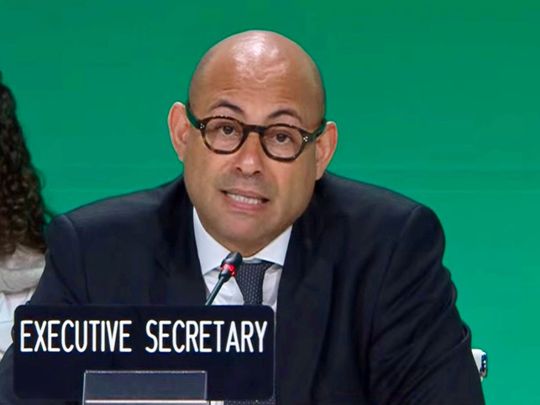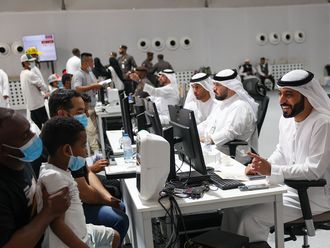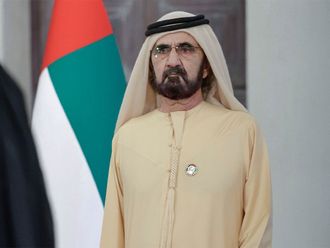
Dubai: The United Nations’ Climate Chief on Friday warned of a 10m sea level rise across the globe if COP28 Parties do not bend emissions in two years to reduce global warming below 1.5°C.
Simon Stiell, Executive Secretary of the United Nations Framework Convention on Climate Change (UNFCCC) which is holding the 28th UN Climate Conference in Expo City Dubai, issued this stark warning about the imminent dangers of failing to curb emissions at a Plenary session.
Addressing the Parties on the Global Stocktake text that they will come up with during the second week of negotiations at COP28, Stiell cautioned them about the lens through which they should look at it.
Stiell highlighted the urgency, stating that a failure to bend the emissions curve in the next two years could lead to irreversible tipping points with catastrophic consequences.
“If you don’t begin bending the emissions curve in the next two years, we will pass key tipping points,” warned Stiell.
“What you’re negotiating today can set our trajectory on these points of no return,” said Stiell.
Dangers of crossing 1.5°C
Scientists see 1.5 degrees of warming as a crucial tipping point. If temperatures go beyond this, there is a higher risk of severe flooding, droughts, wildfires, and food shortages.
“If we pass these key thresholds, we can never go back from the planet’s perspective. 1.5 is a tangible limit. It is not simply a choice. Past 1.5 degrees, and we’re likely to irreversibly lose ice sheets. If they go, there will be a 10m sea level rise across the globe. This will flood central parts of most coastal cities and coastal areas, forcing hundreds of millions of people to relocate towards 1.5 and we’re likely to lose all tropical coral reef systems, which provide the sustenance and livelihoods to hundreds of millions of people.”
He said past 1.5 models predict that in less than 50 years, 2 billion people will live in areas so hot, they are beyond the human limit and are a threat to life.
“The transition we need to make is nothing compared to the one that will be forced on us if we let go of the 1.5 ambition.”
Political commitment, strong text
Stiell called for political commitments to implement the technology that can help save the world.
“Technology can help us but it can only complement political commitments. It cannot replace them. So when you’re looking at the Global Stocktake text, look at it through this lens.”
Stiell pointed out that the initial text is a mix of posturing and basic positions. “Today, we have a starting text that is a mixture of posturing and lowest common denominator positions.”
He stressed the importance of a strong text on the global goal of adaptation, with science-based targets guiding policies for a just transition. “Posturing and undue procedural hindrances must not stand in the way of an effective outcome on this matter … These texts must signal the investments in the transition that are going to make it all possible.”
As negotiations intensify, Stiell urged prioritising the highest ambitions to save lives and keep the 1.5-degree goal within reach. Compromises are acceptable, but not on the 1.5-degree target, and adaptation must not be overlooked, he said.








